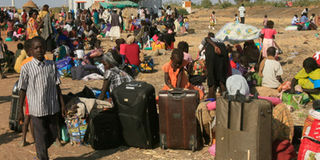South Sudan crisis: Yet another African dilemma

South Sudan refugees.
What you need to know:
Political processes determine what economic institutions people live under, and it is the political institutions that determine how this process works. These institutions must be allowed an opportunity to be born and grow; unfortunately this has not been the case with Africa due to indigenous and exogenous unprincipled factors.
“Whenever you possibly can, do good to those who need it. Never tell your neighbours to wait until tomorrow if you can help them now” Prov.3:27-28.
Each society functions with a set of economic and political rules created and enforced by the state and the citizens collectively.
Political processes determine what economic institutions people live under, and it is the political institutions that determine how this process works. These institutions must be allowed an opportunity to be born and grow; unfortunately this has not been the case with Africa due to indigenous and exogenous unprincipled factors.
The African continent has never been left alone to determine her destiny just because, she is poor, so those who come to ‘help’ determine the road to take, even if unclear. The crisis in many countries on the continent is that of state formation, which has always to be tailored on the known Western leviathan, despite its failures in many places.
The recent flare up in South Sudan is yet the latest reminder of the dilemma of the African state. According to the West, a country is only democratic if there has been an election, where the winner takes it all, irrespective of the obtaining political, economic and social realities. The results have always led to the bigger ethnic group or the dominant religion taking power. In such event, the winners embark on consolidation of their hold on power, which is alright by all standards.
We have heard complaints that such and such a group or a person has over stayed in power! A close look at history does not reveal anyone that has ever worked for loss of power consciously. Thus, the state in Europe and USA is always controlled by the dominant class, with the only change being the person at the top, as per the ruling class design. That is why when an individual proves a liability for the part, the individual is over thrown through a party election.
This was the case with the Conservative Party in Britain, when it removed the “Iron Lady” Margaret Thatcher, it was the case with the Labour Party, when Gordon Brown over threw Tony Blair.
It is instructive to note that in Europe, the bigger countries have no term limits, indeed, German chancellor Angela Merkel has just been elected for a third term. This is informed by these countries political history, which had their own fear share of ethnic strife’ e.g. the Welsh vs English, the Scots vs the English or the English against the Irish.
The evolution of the European leviathan without external interference has ensured its strength and resilience against both political and/or economic upheavals. Indeed Italy had 48 governments in the first 45 years after the World War II, but the country remained together.
One ought to know that each of these countries had bitter wars for unification which were worn by the strongest side and therefore followed its own programme of state formation without interference. In some cases human rights were abused to the extent of almost committing genocide!! Nonetheless, the objective of state building was served by blood and iron and beating the dissenters into submission.
I should not be mistaken for a sadomasochist or a sadist, not at all. Rather, I am submitting that the crisis on the African state is a product of colonial misrule (no democracy) economic exploitation by the colonisers, and lack of leadership training as well as lack of national consciousness.
How can you undertake a multi-party general election in a society that is peasantry and those that are in the dominant class have been clerks or guerrillas who have no iota of leadership training.
We may well be informed that even the supper power, USA, had presidents assassinated, which is a sign of instability, but the fruits of the war of independence and the civil war built a strong state. In short, it is pressure that makes diamonds strong. Thus as Africa continues to feel the pressure of the liberal agenda of democratisation and pluralism, the state must build capacity to direct the political process, while ensuring the economic emancipation of our people.
Like the late Mwalimu Nyerere said “let me be free to make mistakes”, in response to those colonialists that were against the independence of the African states, there is need to allow the African countries to evolve out of chaos, build their own structures that eventually within stand chaos. With due respect to those that have argued that there was no coup attempt in Juba, they may need to explain why Dr Riek Marchar’s first condition for talks was the demand for the resignation of an elected president!
For anyone to have pushed for elections in South Sudan, then advise them to discard political education in SPLA was to condemn that country to failure of state formation. As if that is not bad enough, for anyone to deny that what transpired in Juba was not a coup attempt, the causes not withstanding is an attempt to white-wash a crime.
Secondly, to force the young government in Juba to ignore that coup attempt and instead massage the makers is to undermine the state of South Sudan, which has been the case in Central Africa, in DRC and other areas.
In short, whoever claims to love Africa, must allow the crystallisation of the state that is strong enough to stabilise society and guarantee the transformation of society, which in turn will be enlightened enough to make informed political decisions for future generations.
Col Felix Kulayigye is the UPDF chief political commissar




